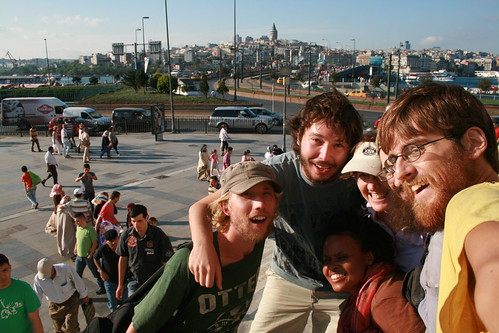Playing Plovdiv
Saturday, August 2nd, 2008Bulgaria’s second biggest city sprawls across the center of the glacial valley up which we had biked for the past four days. We arrived in the rain. We ate lunch under an overpass next to cigarette butts and a car detailing service. The skies cleared as we emptied the bags that had held lunch, so we continued on the damp streets to the center of town. My intrepid guiding skills led us successfully back to the walking street and posh shopping district. The young members of FBR found a closed store front against which to lean the bikes. Netzy, who had been hotel and shower free for several days, sought the solace of a hostel that might let her pay for a shower. The rest of FBR endeavored to convince shoppers we were good enough to pay.
With the erhu case in front of us and classic FBR hits like “The Tea Song” and “Zombie” reverberating through the commercial streets, people soon began dropping in coins. I had to avoid laughing at them. Don’t they know we’re not professionals? I thought to myself. Professional or not, we kept getting money. Then the cops came. “This,” said one, gesturing at the erhu case, “no money” he concluded simply enough. We took away the erhu case, but continued playing. We were a bit disappointed, perhaps, but we play mostly for pleasure. If there’s money to be made, then so be it, but with no money we’ll happily play just about anywhere.
We had been playing for a couple of hours when our show suddenly involved a large amount of audience participation. A young women with slightly crooked teeth approached me in the middle of one of the songs. She explained she could play guitar. We handed her a guitar, and she strummed out an English song none of us had ever heard before.
Before we knew it, a spry man with silver hair had procured Drew’s guitar. He started singing Sinatra in a deep, gravelly voice that could have been Fats Domino’s. Wearing the guitar on its strap, he two-stepped in the street. We accompanied him as best we could. Soon we had a huge crowd.
Street kids showed up. Nakia paged through pictures of our journey Pete had put into an album with the street kids. The silver-haired fellow continued his solo performance. He caught the eye of passersby and sang directly to them. One of the street kids, his facial muscles clenched in a grimace for effort, did a tripod on the street.
We found ourselves talking to a Plovdivian with perfect English, also a musician. Our nearly-octogenarian crooner had moved on to Louis Armstrong. The homeless kids chatted loudly, but were hushed by a toothless, apparently homeless woman who danced to the songs sung by the old fellow. She gestured to the harmonica Drew held in his hands. “I can play that!” she indicated. Drew handed it over. She tooted out a few notes and demonstrated her harmonica efficacy, but the key didn’t match the Louis Armstrong song. She handed it back to Drew.
In the meantime, a man with a classy hat and a huge beer gut had picked up the drum at the insistence of his wife. “He plays the drum wonderfully!” she had gestured to us. He accompanied the older musician for a while, but soon moved on.
Storm clouds had come back to obscure the sky. With the help of the English speaker, we got the old man to give back the guitar. “He’s been a performer for 60 years,” translated our translator. One of the street kids asked for money. One of the other street kids told him to knock it off. We said good-bye to everyone and packed everything up, just in time to seek shelter from the rain under an awning.



